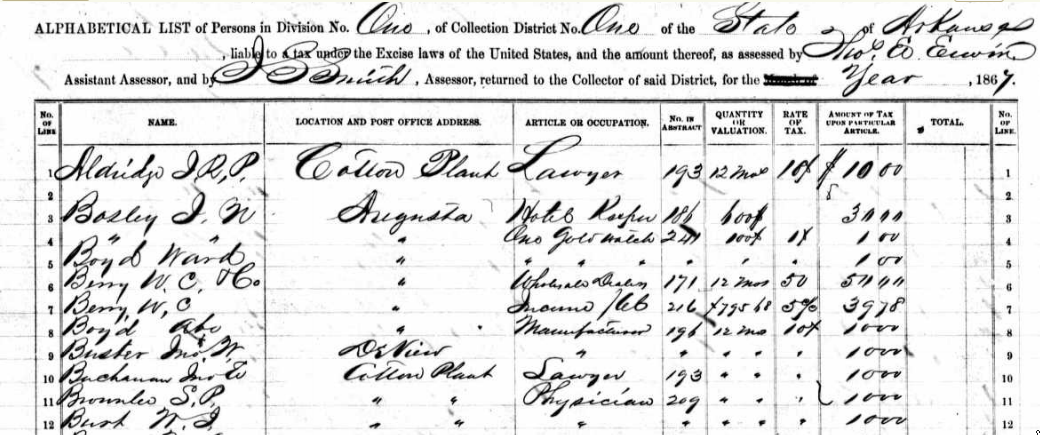Genealogy Tips: Find Ancestors in Tax Records
It’s time to pay taxes in the United States! 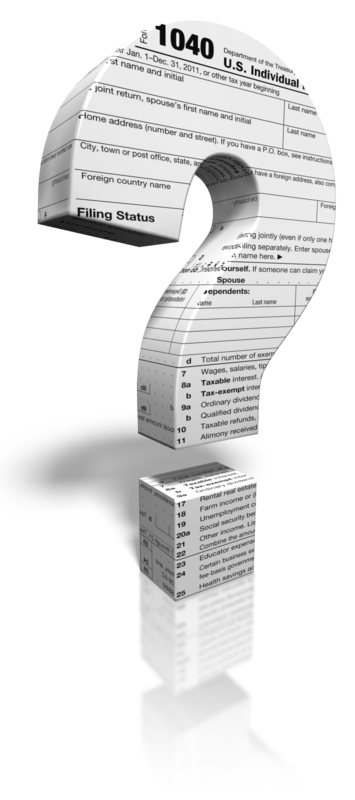 Is it any consolation that our ancestors paid them, too? Here’s a brief history of U.S. federal taxation and tips on where to find tax records for the U.S. and the U.K.
Is it any consolation that our ancestors paid them, too? Here’s a brief history of U.S. federal taxation and tips on where to find tax records for the U.S. and the U.K.
History of Tax Records
According to the National Archives (U.S.), the Civil War prompted the first national income tax, a flat 3% on incomes over $800. (See an image of the 16th Amendment and the first 1040 form here.)
The Supreme Court halted a later attempt by Congress to levy another income tax, saying it was unconstitutional.
In 1913 the 16th Amendment granted that power. Even then, only 1% of the population paid income taxes because most folks met the exemptions and deductions. Tax rates varied from 1% to 6%–wouldn’t we love to see those rates now!
Where to Find Tax Records
Ancestry.com has indexed images of U.S. federal tax assessment lists from the Civil War period (and beyond, for some territories).
Here’s a sample image from Arkansas:
Of course, the U.S. federal income tax is just one type. Taxes have been levied on real estate, personal property and income by local, regional and national governments throughout the world.
Some tax records can be found online at the largest genealogy websites.
Here are examples of tax records that can be found at Ancestry:
- tax records from London (1692-1932);
- the U.S. states of Pennsylvania, Tennessee, New York, Ohio, Georgia and Texas;
- and many from Scotland, Ireland, Canada and Russia (there’s more: see a full list and descriptions here).
FamilySearch.org hosts over a million records each of U.S. state tax records from Ohio and Texas.
FindMyPast hosts a wealth of U.K. tax records, from local rate books to Cheshire land taxes and even the Northamptonshire Hearth Tax of 1674.
In addition to genealogy websites, here in the U.S., look for original real estate and personal property taxpayer lists in county courthouses or state archives.
It’s also a good idea to consult genealogical or historical organizations and guides. A Google search for “tax records genealogy Virginia” brings up great results from the Library of Virginia and Binns Genealogy. And here’s a search tip: Use the keyword “genealogy” so historical records will pop up. Without that term, you’re going to get results that talk about paying taxes today.
If you still haven’t found the tax records you are looking for, there are two more excellent resources available for finding out what else might be available within a particular jurisdiction.
The first is the FamilySearch Wiki. From the home page you can drill down using the map, or try a search in the search box. Search for the jurisdiction and the keyword tax. Click through to the page for that jurisdiction. Typically you will find a table of contents that includes links to the section of the page covering various topics. Look for a link to tax, taxes, tax records, or taxation. They will list known sources for tax records in that area.
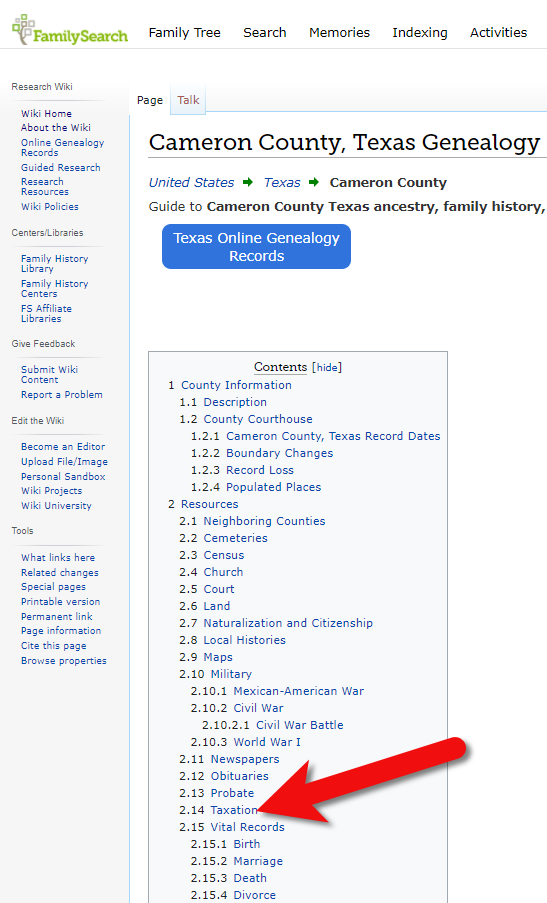
Tax records at the familysearch wiki
The second resource for finding out what else might be available is the free USGenWeb site. Like the FamilySearch Wiki, it’s organized by location / jurisdiction. Drill down to the place and then look for the section listing the known records for that area and look for tax related links.
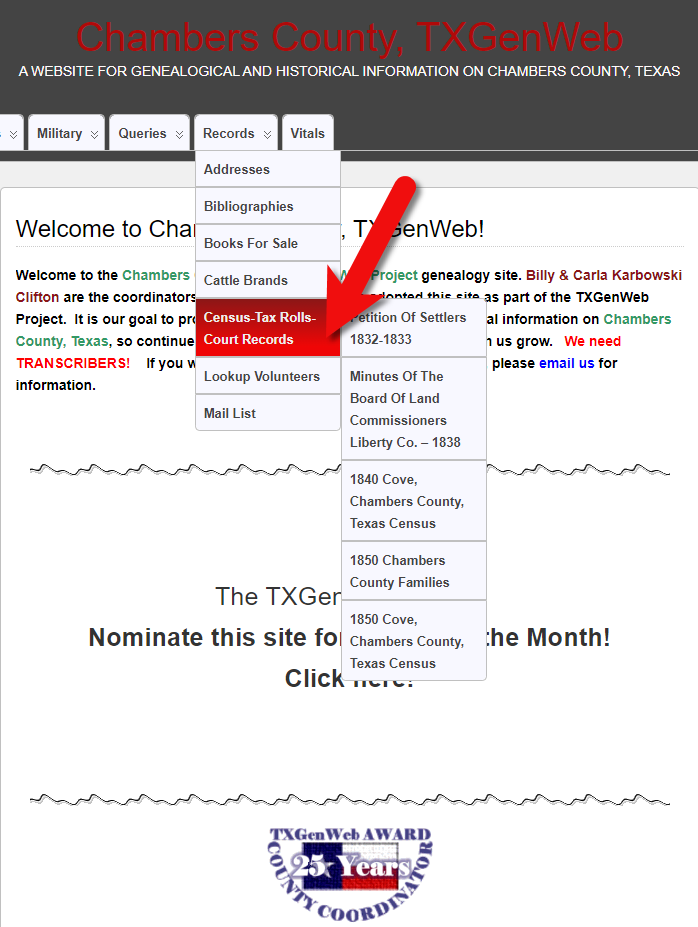
Find information about tax records at USGenWeb
Why It’s Worth Finding Tax Records
I’ll leave you with this tantalizing list of data gathered in the Calhoun County, Georgia tax list of 1873. It enumerates whites, children, the blind/deaf/dumb, dentists, auctioneers, and those who have ten-pin alleys, pool tables and skating rinks. Then, real estate is assessed in detail. Finally, each person’s amount of money, investments, merchandise, household furniture, and investment in manufacturing is assessed.
As you can see, it can pay you big to invest time in looking for your ancestor’s tax records! Just make sure that if you’re here in the U.S., you’ve got your own taxes out of the way before you go searching for someone else’s.
Millions of global records now at FamilySearch.org
Millions of records from around the world are new at FamilySearch this week, and are completely free! These new collections include Australia, Denmark, Finland, France, Italy, and South Africa. PERSI also got a big update this week at Findmypast, as well as new and updated records for Canada, England, and Ireland.
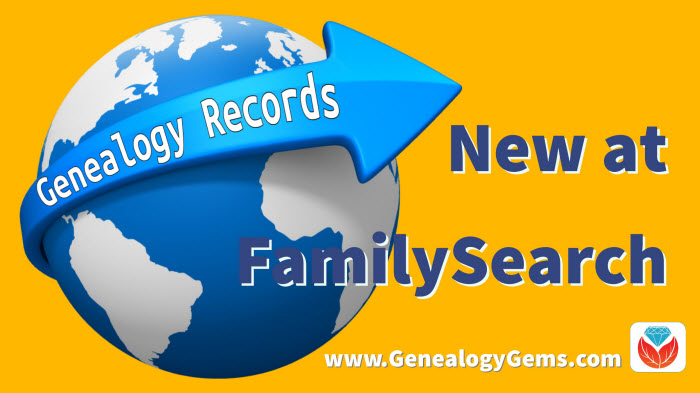
New collections free at FamilySearch
Australia. The new South Australia, Immigrants Ship Papers, 1849-1940 collection includes immigrants’ ships papers, containing a record of births and deaths aboard, 1849-1867 and 1873-1885. Indexed records in this collection include passenger lists arriving and departing from South Australia. (Original records in the State Records of South Australia, Adelaide.) Get started with Australian genealogy research with these tips from an expert at Legacy Tree Genealogists!
Denmark. FamilySearch has been adding census records for Denmark recently, and the latest new collection is the 1921 Denmark Census. This collection includes over 430,000 images, and these census collections were all provided by MyHeritage and previously from the National Archives of Denmark.
Finland. Church Census and Pre-Confirmation Books, 1657-1915: This collection contains church census books and pre-confirmation books kept by the Lutheran Church in Finland. These records come from a database at MyHeritage, citing Kansallisarkisto (National Archives of Finland), Helsinki.
France. Explore over half a million indexed records for Saône-et-Loire, Census, 1856, a complete indexing of the population censuses.
Italy. The Salerno, Civil Registration (State Archive), 1806-1949 collection includes civil registration (stato civile) records of births, marriages, and deaths within the custody of the State Archive of Salerno (Archivio di Stato di Salerno). Almost 6 million images are in this collection, and availability of records is largely dependent on time period and locality.
South Africa. Lastly, this collection of Pietermaritzburg Estate Files 1846-1950 is also new at FamilySearch. Records include death notices, vital records, wills, distribution accounts, and succession duty accounts.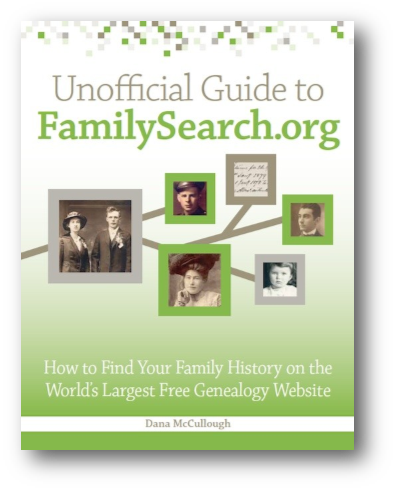
Need help using FamilySearch? The Unofficial Guide to FamilySearch.org by Dana McCullough provides the guidance you need to discover your ancestors and make the most of the free site’s valuable resources. Learn how to maximize all of FamilySearch.org’s research tools–including hard-to-find features–to extend your family tree in America and the old country.
PERSI update at Findmypast
The Periodical Source Index (also known as PERSI) has had another large update at Findmypast. Almost 11,000 new articles and 30,000 new images have been added, covering Pennsylvania, Wyoming, Toronto, and Yorkshire. PERSI is an excellent resource for discovering articles, photos, and other material you probably won’t find using conventional online search methods.
Click here to learn more about PERSI for genealogy research. Genealogy Gems Premium Members can also check out Premium Podcast episode #135 for more tips on PERSI (sign-in required). Not a Premium Member? Click here to get started!
Canada – New & Updated Collections
From Libraries and Archives Canada: Digitization of the Canadian Expeditionary Force Personnel Service Files. “As of today, 502,740 of the 640,000 files are available online in our Personnel Records of the First World War database…Library and Archives Canada is digitizing the service files systematically, from box 1 to box 10686, which roughly corresponds to alphabetical order.”
Ancestry.com updated two of their collections for Canada this week: Ontario, The Ottawa Journal (Birth, Marriage, and Death Notices) 1885-1980 and the Canada Obituary Collection, 1898-2017. Both of these collections come from microfilmed copies of the newspapers.
England Registrations
Recently announced on Twitter: “The General Register Office for England and Wales (GRO) is piloting a service from 12 October 2017 to provide portable document format (PDF) copies of digitized historical birth and death records. The pilot will run for a minimum of 3 months to enable GRO to assess the demand for this service over a prolonged period.” England and Wales records which are available as PDFs in this extended pilot include births (1837 –1916) and deaths (1837 –1957).
Ireland: Historical Newspaper
A new historical newspaper title was added to the British Newspaper Archive this week for Northern Ireland. The Coleraine Chronicle 1844-1910 was published by Alpha Newspaper Group in Coleraine, Londonderry, Northern Ireland. The collection features nearly 3,500 issues and over 26,000 pages.
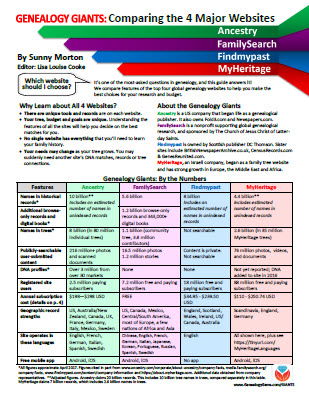 Get the most out of your genealogy records websites subscriptions!
Get the most out of your genealogy records websites subscriptions!
Use the jammed-packed Genealogy Giants cheat sheet by Sunny Morton to quickly and easily compare all of the most important features of the four biggest international genealogy records membership websites: Ancestry.com, FamilySearch.org, Findmypast.com, and MyHeritage.com. Then consult it every time your research budget, needs or goals change. Tables, bulleted lists, and graphics make this guide as easy to use as it is informative. Available in print or digital download.
Disclosure: This post contains affiliate links and Genealogy Gems will be compensated if you make a purchase after clicking on these links (at no additional cost to you). Thank you for supporting the free Genealogy Gems podcast and blog!
New U.S. WWI Military Records for Genealogy
Topping the list of new and updated genealogy records this week are United States military records. Ancestry.com has a new collection of U.S. Navy Muster Rolls and an updated collection of historical postcards. Enjoy a special interview with military expert Michael Strauss on how he solved an old postcard mystery! Also new this week are WWI U.S. records at FamilySearch for Michigan and Utah, which you can access for free online.
Featured: U.S. Navy Muster Rolls
Ancestry.com has a new collection of U.S. Navy Muster Rolls, 1949-1963. From the description:
Historical Postcards
Ancestry.com also recently updated their collection of U.S. Historical Postcards, 1893-1960. You might be wondering how historical postcards would be valuable to your genealogy research. The collection description sheds some light on what you can use this database for:
“This database contains over 115,000 historical postcards with photos of places in the United States. Each postcard caption has been indexed and may be searched by keyword or location. The database also includes the city, county, state, and postcard era (estimated year range) for most postcards.
This database is primarily useful for obtaining a photograph or picture of a specific place in time. If you do not already have pictures of the places your ancestors lived, historical postcards are a good alternative to personal photos.”
In the video below: A captivating story unfolds of old postcards from WWI that are snatched from oblivion by Michael Strauss, who is the Genealogy Gems Podcast Military Minutes man. Michael shares the story of how he found the historic postcards on eBay, and the research process he followed to identify their author. These are strategies that you can use in many areas of your family history research!
FamilySearch
You can explore even more new WWI records for genealogy thanks to FamilySearch’s newest additions to their free records.
- Michigan, Census of World War I Veterans with Card Index, 1917-1919
- Utah, World War I County Draft Board Registers, Name Index, 1917-1918
- Utah, World War I Service Questionnaires, 1914-1918
These records may help you find out more about your ancestors who served in the military during WWI. Depending on the collection and record, you might find:
- name of Veteran;
- serial number;
- address;
- place and date of birth;
- nationality;
- color;
- occupation before and after the war;
- marriage date;
- wife’s name,
- birthplace and date;
- names of children and their birth dates;
- parents’ names and addresses;
- first camp entered and date;
- rank, company, and regiment;
- transfers and promotions;
- battles engaged in;
- discharged date and reason, and additional information.
If you don’t find the person you’re looking for, FamilySearch has these helpful suggestions for next steps:
- Look for variant spellings of the names. You should also look for alias names, nicknames and abbreviated names.
- Look for an index. Local genealogical and historical societies often have indexes to local records.
- Search the records of nearby localities (or military units, counties, parishes, etc.).
More Military Records with Michael Strauss
Michael Strauss is our resident Military Minutes man for The Genealogy Gems Podcast. He first debuted on the show on episode #207, where he talked about draft registrations. Click here to listen to the episode and download an exclusive free 4-page handout! For more expert military research tips and insight, browse Michael’s many articles on our website by clicking here.
About the Author: Lacey Cooke has been working with Genealogy Gems since the company’s inception in 2007. Now, as the full-time manager of Genealogy Gems, she creates the free weekly newsletter, writes blogs, coordinates live events, and collaborates on new product development. No stranger to working with dead people, Lacey holds a degree in Forensic Anthropology, and is passionate about criminal justice and investigative techniques. She is the proud dog mom of Renly the corgi.
Disclosure: This article contains affiliate links and Genealogy Gems will be compensated if you make a purchase after clicking on these links (at no additional cost to you). Thank you for supporting Genealogy Gems!
Genealogy for Beginners: FREE Podcast Series
The FREE Family History: Genealogy Made Easy podcast series teaches genealogy for beginners with step-by-step, hands-on help at a friendly pace!
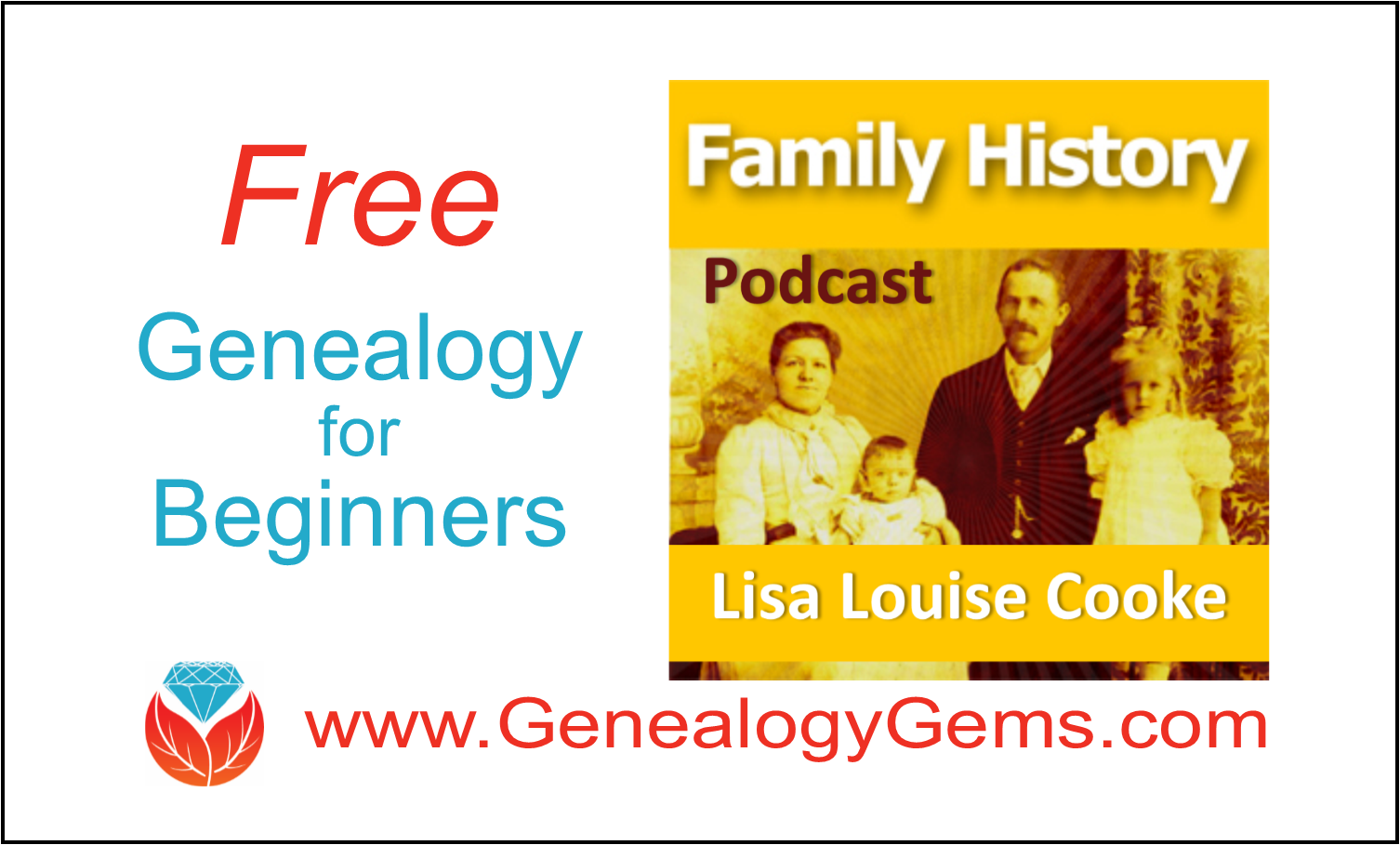
“Which podcast is best for beginning genealogists?” This question recently came from our reader and listener, Beverly.
It cued me to remind everyone about my FREE Family History: Genealogy Made Easy podcast! I created it for beginners to help them get started in a fun and easy way, and for more advanced researchers who want to brush up on their family history research skills in a step-by-step fashion.
Are you new to podcasts?
A podcast is like an online, on-demand radio show. You can listen whenever and wherever you want because they are recorded! Here’s a link to frequently asked questions about podcasts.
Get My Free Podcast – Perfect for Beginners!
To access the Family History: Genealogy Made Easy podcast:
1. Go to www.genealogygems.com
2. Hover your mouse over Podcast
3. Click on Family History: Genealogy Made Easy
4. Click the link for episode 1 entitled Getting Started (episodes are in numerical order.)
5. Click Play Now and then click the play button to listen on your computer.
6. You can also subscribe through iTunes here.
Get More Podcast Episodes, and Our App!
After you get started, enjoy the back episodes of the free Genealogy Gems Podcast for tons of additional ideas and strategies. The easiest way to listen is through the Genealogy Gems app available for Apple, Android and Windows.
More Gems: Genealogy for Beginners
We really want you to see Genealogy Gems as your guide through the fun and fascinating world of family history. That means in addition to our podcasts, we write loads of how-to articles just for you. To get instant access to all of our blog posts just right for beginners, click ARTICLES in the menu and select any article. On every article page there is a Categories menu. Click the down arrow, and click Beginner. On your screen you will see all of our Beginner articles in chronological order starting with the most recent.
4 Beginning Genealogy Answers to Get You Started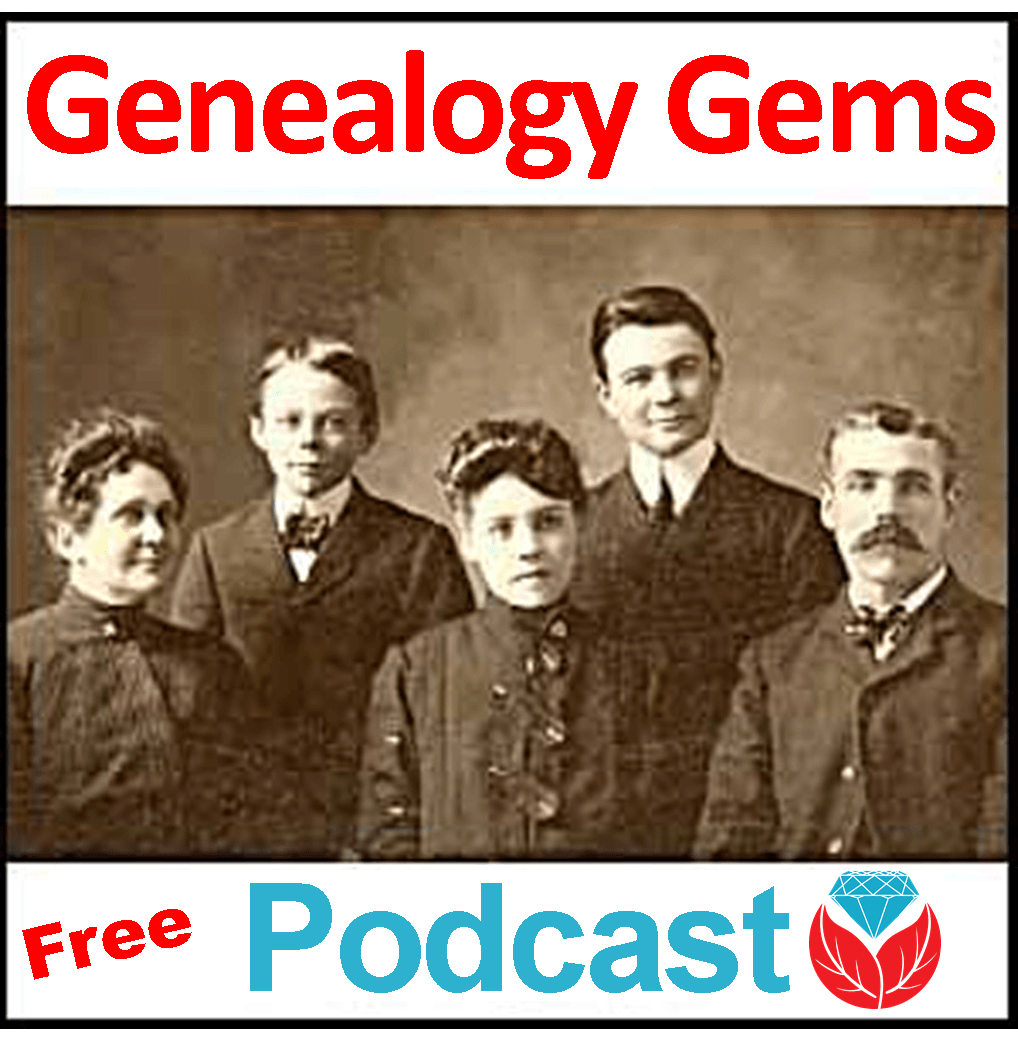
6 Sources That May Name Your Ancestors’ Parents
Try These Two Powerful Tools for Finding Genealogy Records Online: Google and FamilySearch Wiki

